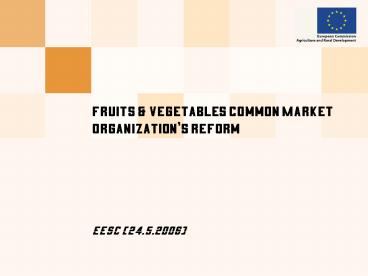Fruits PowerPoint PPT Presentation
1 / 30
Title: Fruits
1
Fruits Vegetables Common Market Organizations
reformEESC (24.5.2006)
2
Outline
- The current F V CMO
- - Fresh products
- - Processed products
- The reform process
- Aims of the reform
3
The current F V CMO.Fresh Products (reform
1996)
- Producers Organizations (PO) role is totally
modified. They are set up in order to improve
market orientation, quality of the products and
environmental management - Introduction of co-financing
- ? 50 POs
- ? 50 EU
- Restricted volumes eligible for withdrawals
4
Budget evolution since 1996
5
Budget expenditure 2005 (M)
Total 634,4 million
6
- Main features in F and V market
7
- Concentration of the retailers
- Concentration of the retail sector is increasing.
- Large retail chains account for 70-90 of all
food retail in France, Germany, the Netherlands,
the UK and Nordic countries. - Discounters strengthen their position (Germany
51). - Large retail chains increase their market share
in new MS. Strong development of discount chains.
8
2. Insufficient grouping of the supply. Ratio
of POs on the Total Production in 2000- 2004
9
unbalanced geographical coverage.( of
production marketed by POs)
10
and
- Increased EU production for some products, or
- Increased imports for others or
- Increase of both EU production and imports
- Stagnation and even decreasing consumption
11
Processed products How the system works
- 1est Cluster tomatoes, citrus fruits, peaches
and pears - 2º Cluster Dried figs and plums
- 3er Cluster Dried grapes
12
1º Tomatoes, citrus, peaches and pears
- EU aid expressed in /t of raw material
delivered for processing - EU/MS thresholds fixed by the Council
- Signature of Contracts between POs Processors
- Deliveries
- Aid request
- Payment of aid to POs ? POs pay to Producers
13
2º Dried figs and plums
- Aid per Tonne 258,57
- Minimal Price 878,86 /t
- Fixation of Minimum Price to be paid to
producers. - Fixation of Aid
- MAXIMUM AMOUNT Min price Price 3rd countries
- Price in 3rd countries calculated on the basis
of EU import price.
14
3º Dried grapes
- Aid per Hectare (2.603 ) conditional to a
minimum yield - Minimum Yield sultanas 3 t/Ha
- The maximum guaranteed Community area 53.178
hectares - Fixation of Aid AMOUNT based on
- evolution of areas
- Price in 3rd countries calculated on the basis
of EU import price
15
Processed Tomatoes main MS ? IT, EL, ES PT
TOMATOES 2004-2005
UE 11,4 million T (65)
PL 117 787 T (50)
FR 215 667 T (25)
SK,HUMT 163 821 T (50)
ES 2 310 842 T (50)
PT 1 011 330 T (84)
IT 6 363 659 T (90)
EL 1 187 609 T (55)
16
Processed Citrus Fruits
CITRUS 2004-2005
UE 2,4 million T (23)
ES 877 987 T (15)
IT 1 268 912 T (40)
PT 23 244 T (7)
EL 257 450 T (26)
17
PEACHES NECTARINES processed raw material
PEACHES NECTARINES 2004-2005
UE 404.879 T (11)
FR 6.039 T (1,5)
ES 112.678 T (10)
IT 21.779 T (1,5)
EL 264.384 T (44)
18
Dried plums processed raw material (in tons)
Plums 2004-2005
UE 47.143 T
FR 45.602 T
ES 329 T
IT 1.212 T
19
DRIED FIGS processed raw material
DRIED FIGS 2004-2005
UE 11.913 T
ES 6.945 T
PT 21 T
EL 4.947 T
20
DRIED GRAPES processed raw material
DRIED GRAPES 2004-2005
UE 74.255 T
ES 925 T
CY n.a.
PT 17 T
EL 73.314 T
21
Budget evolution since 2000
22
Budget expenditure 2005 (M)
Total 848.9 million
23
Processed products Common features
- Aid in Amber Box
- Complex regulation
- Not enough market oriented
24
The F and V CMO reform
- Starting point
- Commission Comunication (August 2004)
- The Dutch Presidency Conclusions (Nov. 04)
- The own-initiative EP opinion (May 05)
- Institutions, MS and sectors opinions
25
The Dutch Presidency Conclusions
- Processed products and citrus.
- It is recognized that the current regime plays
an important role in employment in rural areas
and in restructuring the sector and in
maintaining a market balance. Taking this into
account, the Commission should carry out the
appropriate impact analysis on all aspects of
this question concerning a possible shift from
the current regimes to an approach based on
objectives and instruments already used in the
2003 CAP reform.
26
Evaluations
27
Impact Assessment Group
- Setting up in September
- Hearing (15 March 2006)
- Advisory Committee (18 May 2006)
- Consultation document
28
Aims of the reform (I)
- contribute to a better distribution of the value
along the chain - strengthen the coherence between the structural
measures in the CMO and those in the rural
development policy - bring the CMO's instruments closer to the
reformed CAP's approach - help the horticultural sector overcome short-term
crises - encourage better nutrition for better health
among Europeans, by advocating the consumption of
fruit and vegetables
29
Aims of the reform (II)
- increase the coherence between the environmental
approaches of the CMO, the reformed CAP and its
second pillar - target the CMO's environmental approach on the
main problems posed by the production and
marketing of fruit and vegetables - simplify marketing standards and direct them
towards the promotion of quality and sustainable
development - Promote the monitoring of relations and
cooperation within the value chain.
30
Scheduled calendar
- November-2006 Council proposal
- First semester 2007 discussions PE-Council.
- Second semester 2007 Commission Regulations
approval - 2008 Entry into force of the new CMO

